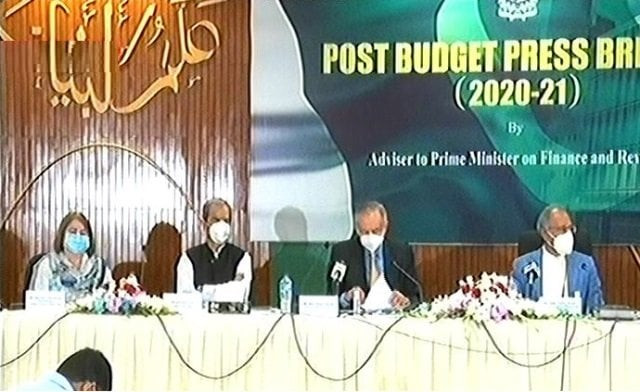Govt admits tax target unachievable
De facto finance minister advises provinces not to make budgets on basis of Rs4.963 trillion target

 Adviser to the Prime Minister on Finance Dr Hafeez Shaikh has advised the provinces not to make their budgets on the basis of proposed Rs4.963 trillion tax collection target, admitting that he is not confident if the target can be achieved.
Adviser to the Prime Minister on Finance Dr Hafeez Shaikh has advised the provinces not to make their budgets on the basis of proposed Rs4.963 trillion tax collection target, admitting that he is not confident if the target can be achieved.“I cannot say with confidence that it [Rs4.963 trillion target] can be achieved but we should make efforts,” said the de facto finance minister at the annual post budget press conference on Saturday.
Dr Shaikh was responding to a question as to how the government will collect additional Rs1.1 trillion taxes if its claim is true that no additional tax measures are taken in the budget.
The adviser’s candid admission gives credence to the claims that the fiscal year 2020-21 budget, which was unveiled on Friday, is unrealistic even before it is passed by the National Assembly.
Shaikh also did not disclose whether the International Monetary Fund (IMF) –whose programme revival appears the only objective of the budget – would soon call a board meeting to approve the second review of the $6 billion deal. The programme technically remains suspended for last few months.
The adviser also ducked a question as to who lobbied for giving income tax exemption to the Lahore University of Management Sciences (LUMS) –an institute that charges hefty fees but is being exempted from paying income tax.
No satisfactory response was given to the question about setting Rs249 billion primary budget deficit target when the Ministry of Finance’s own calculations showed that the primary deficit cannot be less than Rs550 billion.
Shaikh said the government has not imposed any new tax in the budget, arguing, that if the Covid-19 stricken economy recovered early, the additional taxes of Rs1.1 trillion could be collected in the next fiscal year.
However, the Finance Bill 2020 shows the government has introduced a new tax on large-sized homes and farm houses in vicinity of Islamabad, which has a population of over 2 million. According to an exclusive report of The Express Tribune, the government has levied at least Rs200 billion additional taxes.
“The provinces should make their budgets while keeping in mind the Federal Board of Revenue’s (FBR) past performance and difference between performance, projections and reality,” said Shaikh while commenting on the adverse implications of the unrealistic budget on the provincial governments.
“During my recent conversations with provincial chief ministers and finance minister, I have told them that they should not rely on our assumptions and instead increase their taxes and cut expenditures.
“If they are not comfortable with our tax collection target, then they should not make budget on the basis of Rs4.963 trillion target,” said Hafeez Shaikh.
The four federating units receive 57.5% of the gross divisible pool as their share under the National Finance Commission (NFC) award.
For the outgoing fiscal year, the government had projected provincial share in the federal taxes at Rs3.254 trillion but its revised estimates showed that the four federating units would receive only Rs2.4 trillion. The revised share is Rs852 billion or 26.2% less than the projected shares.
For next fiscal year, the Ministry of Finance has projected the provinces’ shares at Rs2.87 trillion on the basis of Rs4.963 trillion FBR’s target. But now the finance adviser has given a message to the province that they should not rely on them.
The NFC shares constitute over 80% of the provincial revenues and any shortfall in the FBR’s collection adversely affects their expenditure plans. The provincial cash surpluses also help keep the overall budget deficit low, as the federal government runs huge fiscal deficits.
While responding to a question on the IMF, Shaikh said Pakistan enjoys good relations with the Fund but he did not disclose whether the IMF was satisfied with the budget and can call a board meeting to approve next loan tranche.
The IMF has delayed the approval of the second review of the programme after Pakistan could not meet conditions on mini budget introduction and increase in electricity prices.
Dr Sheikh said the budget for next fiscal year is focused on coping with the impacts of Covid-19 and provide relief to the masses.
“The basic pillar of the budget is that no new tax is imposed in it, rather concessions worth Rs40-50 billion have been given in taxes and duties to support industrial sector and create job opportunities.”
Shaikh said the government has taken the difficult decisions of cutting its own expenditures keeping in mind the problems faced by the masses.
He said the development outlay has been set at Rs650 billion while allocations for Ehsaas Programme have also been enhanced to protect the vulnerable segments of the society.
“The present government is taking loans to clear the loans taken in the past. We paid back Rs2.7 trillion of loans last year and this year we will pay back Rs2.9 trillion in loans,” he said.
Giving a breakup of the relief given in taxes, the adviser said regulatory duty on 1,623 tariff lines of raw materials are totally being done away whilst on others including those related to engineering sector are also being reduced. The adviser said 10 different types of withholding tax are also being abolished.
Sheikh said massive relief has also been given to different sectors especially the construction. The Capital Gains Tax is being halved whilst the federal excise duty on cement has been cut.
The adviser said the sales tax for the retailers opting to link themselves with the FBR is being reduced to 12%. The duty on hospitality sector is being reduced from 1.5% to 0.5%. He said taxes and duties are being abolished on the testing kits of coronavirus and cancer.
He said the government also tried its level best to pass on the benefit of lowering petroleum prices to the people. The adviser said the world institutions including the IMF, World Bank and Asian Development Bank are appreciative of the financial discipline shown by the present government.
Minister for Information Senator Shibli Faraz and Minister for Industries and Production Hammad Azhar also attended the post budget press conference.



















COMMENTS
Comments are moderated and generally will be posted if they are on-topic and not abusive.
For more information, please see our Comments FAQ